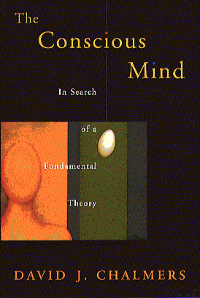Related Research Articles

Consciousness, at its simplest, is "sentience or awareness of internal or external existence". Despite centuries of analyses, definitions, explanations and debates by philosophers and scientists, consciousness remains puzzling and controversial, being "at once the most familiar and most mysterious aspect of our lives". Perhaps the only widely agreed notion about the topic is the intuition that it exists. Opinions differ about what exactly needs to be studied and explained as consciousness. Sometimes, it is synonymous with 'the mind', and at other times, an aspect of it. In the past, it was one's "inner life", the world of introspection, of private thought, imagination and volition. Today, it often includes some kind of experience, cognition, feeling or perception. It may be 'awareness', or 'awareness of awareness', or self-awareness. There might be different levels or orders of consciousness, or different kinds of consciousness, or just one kind with different features. Other questions include whether only humans are conscious or all animals or even the whole universe. The disparate range of research, notions and speculations raises doubts whether the right questions are being asked.

Daniel Clement Dennett III is an American philosopher, writer, and cognitive scientist whose research centers on the philosophy of mind, philosophy of science, and philosophy of biology, particularly as those fields relate to evolutionary biology and cognitive science.
Epiphenomenalism is a position on the mind–body problem which holds that physical and biochemical events within the human body are causal with respect to mental events. According to this view, subjective mental events are completely dependent for their existence on corresponding physical and biochemical events within the human body yet themselves have no causal efficacy on physical events. The appearance that subjective mental states influence physical events is merely an illusion. For instance, fear seems to make the heart beat faster, but according to epiphenomenalism the biochemical secretions of the brain and nervous system —not the experience of fear—is what raises the heartbeat. Because mental events are a kind of overflow that cannot cause anything physical, yet have non-physical properties, epiphenomenalism is viewed as a form of property dualism.

Consciousness Explained is a 1991 book by the American philosopher Daniel Dennett, in which the author offers an account of how consciousness arises from interaction of physical and cognitive processes in the brain.
Functionalism is a viewpoint of the theory of the mind. It states that mental states are constituted solely by their functional role, which means, their causal relations with other mental states, sensory inputs and behavioral outputs. Functionalism developed largely as an alternative to the identity theory of mind and behaviorism.

Freedom Evolves is a 2003 popular science and philosophy book by Daniel C. Dennett. Dennett describes the book as an installment of a lifelong philosophical project, earlier parts of which were The Intentional Stance, Consciousness Explained and Elbow Room. It attempts to give an account of free will and moral responsibility which is complementary to Dennett's other views on consciousness and personhood.

Eliminative materialism is the claim that certain types of mental states that most people believe in do not exist. It is a materialist position in the philosophy of mind. Some supporters of eliminativism argue that no coherent neural basis will be found for many everyday psychological concepts such as belief or desire, since they are poorly defined. Rather, they argue that psychological concepts of behaviour and experience should be judged by how well they reduce to the biological level. Other versions entail the non-existence of conscious mental states such as pain and visual perceptions.
The knowledge argument is a philosophical thought experiment proposed by Frank Jackson in his article "Epiphenomenal Qualia" (1982) and extended in "What Mary Didn't Know" (1986). The experiment is intended to argue against physicalism—the view that the universe, including all that is mental, is entirely physical. The debate that emerged following its publication became the subject of an edited volume—There's Something About Mary (2004)—which includes replies from such philosophers as Daniel Dennett, David Lewis, and Paul Churchland.
The hard problem of consciousness is the problem of explaining why and how we have qualia or phenomenal experiences. That is to say, it is the problem of why we have personal, first-person experiences, often described as experiences that feel "like something." In comparison, we assume there are no such experiences for inanimate things like, for instance, a thermostat, toaster, computer, or, theoretically, a sophisticated form of artificial intelligence. The philosopher David Chalmers, who introduced the term "hard problem of consciousness," contrasts this with the "easy problems" of explaining the physical systems that give us and other animals the ability to discriminate, integrate information, report mental states, focus attention, and so forth. Easy problems are (relatively) easy because all that is required for their solution is to specify a mechanism that can perform the function. That is, even though we have yet to solve most of the easy problems, these questions can probably eventually be understood by relying entirely on standard scientific methods. Chalmers claims that even once we have solved such problems about the brain and experience, the hard problem will "persist even when the performance of all the relevant functions is explained".
Heterophenomenology is a term coined by Daniel Dennett to describe an explicitly third-person, scientific approach to the study of consciousness and other mental phenomena. It consists of applying the scientific method with an anthropological bent, combining the subject's self-reports with all other available evidence to determine their mental state. The goal is to discover how the subject sees the world themself, without taking the accuracy of the subject's view for granted.
The philosophical zombie or p-zombie argument is a thought experiment in philosophy of mind and philosophy of perception that imagines a being that, if it could conceivably exist, logically disproves the idea that physical substance is all that is required to explain consciousness. Such a zombie would be indistinguishable from a normal human being but lack conscious experience, qualia, or sentience. For example, if a philosophical zombie were poked with a sharp object it would not inwardly feel any pain, yet it would outwardly behave exactly as if it did feel pain.
Daniel Dennett's multiple drafts model of consciousness is a physicalist theory of consciousness based upon cognitivism, which views the mind in terms of information processing. The theory is described in depth in his book, Consciousness Explained, published in 1991. As the title states, the book proposes a high-level explanation of consciousness which is consistent with support for the possibility of strong AI.
The user illusion is the illusion created for the user by a human–computer interface, for example the visual metaphor of a desktop used in many graphical user interfaces. The phrase originated at Xerox PARC.

In the philosophy of mind, the China brain thought experiment considers what would happen if each member of the Chinese nation were asked to simulate the action of one neuron in the brain, using telephones or walkie-talkies to simulate the axons and dendrites that connect neurons. Would this arrangement have a mind or consciousness in the same way that brains do?

In philosophy of mind, Cartesian materialism is the idea that at some place in the brain, there is some set of information that directly corresponds to our conscious experience. Contrary to its name, Cartesian materialism is not a view that was held by or formulated by René Descartes, who subscribed rather to a form of substance dualism.

Philosophy of mind is a branch of philosophy that studies the ontology and nature of the mind and its relationship with the body. The mind–body problem is a paradigmatic issue in philosophy of mind, although a number of other issues are addressed, such as the hard problem of consciousness and the nature of particular mental states. Aspects of the mind that are studied include mental events, mental functions, mental properties, consciousness, the ontology of the mind, the nature of thought, and the relationship of the mind to the body.

"What Is It Like to Be a Bat?" is a paper by American philosopher Thomas Nagel, first published in The Philosophical Review in October 1974, and later in Nagel's Mortal Questions (1979). The paper presents several difficulties posed by consciousness, including the possible insolubility of the mind-body problem owing to "facts beyond the reach of human concepts", the limits of objectivity and reductionism, the "phenomenological features" of subjective experience, the limits of human imagination, and what it means to be a particular, conscious thing. Nagel famously asserts that "an organism has conscious mental states if and only if there is something that it is like to be that organism—something it is like for the organism." This assertion has achieved special status in consciousness studies as "the standard 'what it's like' locution." Daniel Dennett, while sharply disagreeing on some points, acknowledged Nagel's paper as "the most widely cited and influential thought experiment about consciousness." Peter Hacker analyzes Nagel's statement as not only "malconstructed" but philosophically "misconceived" as a definition of consciousness, and he asserts that Nagel's paper "laid the groundwork for…forty years of fresh confusion about consciousness."
In philosophy and certain models of psychology, qualia are defined as individual instances of subjective, conscious experience. The term qualia derives from the Latin neuter plural form (qualia) of the Latin adjective quālis meaning "of what sort" or "of what kind" in a specific instance, such as "what it is like to taste a specific apple, this particular apple now".

The Conscious Mind: In Search of a Fundamental Theory was published in 1996, and is the first book written by David Chalmers, an Australian philosopher specialising in philosophy of mind. Though the book has been greatly influential, Chalmers maintains that it is "far from perfect", as most of it was written as part of his PhD dissertation after "studying philosophy for only four years".
The concept of absent qualia is one of two major Functionalist objections to the existence of qualia, the other being the inverted spectrum hypothesis. Qualia is a philosophical term used to refer to an individual's subjective experience, that is to say, the way something feels to that individual at that particular moment.
References
- ↑ Dennet, Daniel (1997). "Quining Qualia". In Ned Block (ed.). The Nature of Consciousness . Cambridge: MIT Press. p. 623. ISBN 0-262-52210-1.
| This philosophy-related article is a stub. You can help Wikipedia by expanding it. |